How Does ISIS Fund Its Reign of Terror?
Leah McGrath Goodman
with Janine Di Giovanni & Damien Sharkov
Newsweek
November 6, 2014
Header Image
A man refines oil to produce gas and diesel. A micro-industry for fuel refinament has grown up around the desert town of Al Mansura east of Al Raqqah, the capital of ISIS. Small stills burn oil that is trucked in by the barrel load from the oil fields of Al Hasakah. Each still can process about a thousand litres of crude a day intogas and diesel. ISIS has taken oil fields from Syrian rebels and the government in recent months. They are believed to control hundreds of wells, an important source of income for ISIS and depriving Syrian President Bashar al-Assad’s government of a major source of income.
DAVID ROSE/PANOS-REA/REDUX
The Islamic State’s staggering successes come at a cost. After all, it’s not cheap to wage war and manage territorial conquests whose population is now roughly the size of Austria’s.
So how can ISIS, cut off from the rest of the world by financial and trade sanctions, and under daily aerial and land bombardment by some of the richest countries in the world, afford to maintain a well-armed military and pay other bills?
Interviews with Iraqi, Kurdish, European, Syrian and American government officials, analysts and intelligence agents sketch a portrait of ISIS’s robust, sprawling, and efficient financial operation. The terrorist group relies on a relatively complex system to manage its far-reaching networks. Its currencies of choice—cash, crude oil and contraband—allow it to operate outside of legitimate banking channels. Turkey’s southern corridor, Iraq’s northwestern corridor and Syria’s northeastern corridor are key weak spots, well away from the prying eyes of outside investigators.
ISIS’s financial needs go beyond underwriting terror. “It’s a huge financial package to support 8 million people—which is now the size of the population living in territories under ISIS control,” says Luay al-Khatteeb, visiting fellow of the Doha Brookings Center and director of the Iraq Energy Institute in Baghdad. “ISIS is also supporting tens of thousands of militants who have been at war for months, with new recruits coming in every day. Yet it keeps all these people answerable to them, seems to have incredible cross-border mobility and shows no signs right now of running out of money or fuel.”

INSTITUTE FOR THE STUDY OF WAR
On October 23, Washington’s point person in the fight against ISIS—the U.S. Department of the Treasury’s Undersecretary for Terrorism and Financial Intelligence David Cohen—acknowledged in a speech at the Carnegie Endowment for International Peace in Washington that “[ISIS] has amassed wealth at an unprecedented pace and its revenue sources have a different composition from those of many other terrorist organizations.” ISIS doesn’t “depend principally on moving money across international borders,” he said, but “obtains the vast majority of its revenues from local criminal and terrorist activities.”
This presents a formidable obstacle for the U.S. Treasury, which is accustomed to pursuing its enemies by pressuring established banks to expose their criminal clients. ISIS’s use of middlemen across the Middle East to smuggle cash in and out of its territory, in addition to employing decades-old smugglers’ routes, makes the group especially hard to track.
The reach of ISIS’s financial portfolio is broad and lucrative. Highly localized and multiple revenue streams feed the terrorist organization’s coffers—generating up to $6 million a day, according to Masrour Barzani, head of Kurdish Intelligence and the Kurdistan Regional Security Council.
Suitcases Full of Cash
Secret smuggling routes are often passed on by families from generation to generation, and they were well-secured during the lean years of economic sanctions imposed by the West during Saddam Hussein’s dictatorship in Iraq. Border guards were in on the baksheesh system entrenched in the culture. They would turn a blind eye when cash in suitcases or trucks containing oil or goods passed through their checkpoints. Many smugglers who traded Saddam’s oil across Iraq’s borders to Kuwait, Iran and Turkey are now working the same routes between ISIS-held Iraq and the outside world.
At its heart, the ISIS money machine runs on the fear—and greed—of the millions of people it controls. It also manifests itself in a wide range of financial activities, many of them outsourced via middlemen and driven by hordes of self-interested parties. The U.S. Treasury has declined to estimate the extent of ISIS’s total assets and revenue streams, but Cohen has called it “the best-funded terrorist organization” the U.S. has “ever confronted.”
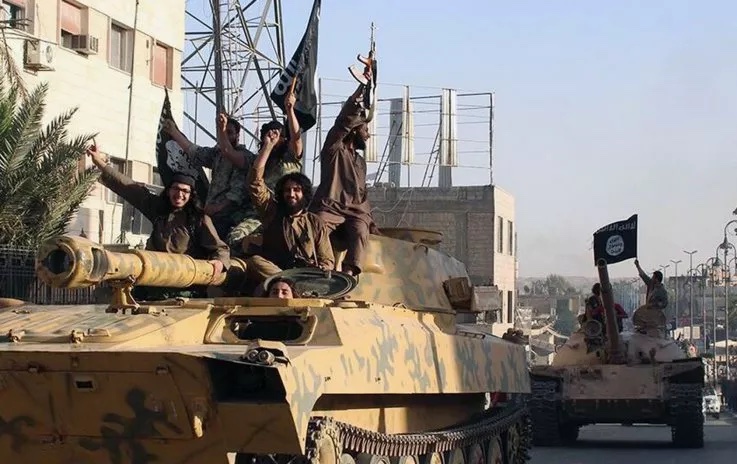
ISIS/AP
Militants parade through the streets of Raqqa, Syria in an undated image posted on Monday, June 30, 2014, by ISIS as propaganda. The United States has made strides toward stitching together a coalition to tackle the extremist group, but faces reluctance from Mideast allies who are deeply frustrated with a White House that they believe has been naive, fickle and weak on Syria’s civil war.
The ISIS economy and its fighters predominantly rely on the production and sale of seized energy assets—Iraq has the fifth-largest proven crude oil reserves in the world. ISIS also depends on the steady income it extracts from private donors, the heavy taxation and extortion it levies on its captive population, the seizure of bank accounts and private assets in the lands it occupies, ransoms from kidnappings and the plundering of antiquities excavated from ancient palaces and archaeological sites.
“You could say ISIS is destructive on an unprecedented scale, because it is not just destroying human lives today,” says Abdulamir al-Hamdani, an Iraqi archaeologist specializing in Mesopotamia at the Department of Anthropology at the State University of New York at Stony Brook. “We’re talking about the destruction of humankind back to the beginning of humankind.”
Royal Donors in the Gulf
Grossing as much as $40 million or more over the past two years, ISIS has accepted funding from government or private sources in the oil-rich nations of Saudi Arabia, Qatar and Kuwait—and a large network of private donors, including Persian Gulf royalty, businessmen and wealthy families.
Until recently, all three countries had openly given hefty sums to rebels fighting Bashar Assad’s Syrian regime, among them ISIS. Only after widespread criticism from Secretary of State Hillary Clinton and the international community did Saudi Arabia pass legislation in 2013 criminalizing financial support of terrorist organizations such as Al-Qaeda, Al-Nusra and ISIS.
In August, ISIS was declared “Enemy Number One” by the most senior Islamic cleric in Saudi Arabia, Grand Mufti Sheikh Abdul Aziz al-Sheikh, and Saudi Arabian bomber and fighter planes joined U.S. airstrikes against ISIS. So far, Qatar and Kuwait have not followed suit.
Lori Plotkin Boghardt, a fellow in Gulf politics at the Washington Institute for Near East Policy in Washington, D.C., tells Newsweek that private donors across the Persian Gulf are continuing to funnel money to ISIS. “Qatar and Kuwait continue to stick out as two trouble spots when it comes to counterterrorist financing enforcement,” she said. Continued financial sanctions imposed on Kuwait and Qatar terrorist financiers by the U.S. Treasury “suggest the U.S. government continues to be concerned about spotty, to say the least, Kuwaiti and Qatari enforcement of their counterterrorist financing laws.”
A couple of factors are frustrating attempts to dam these rivers of cash. First, the relatively open banking systems of Qatar and Kuwait are being skillfully exploited by ISIS, since, unlike Saudi banks, they do not automatically raise red flags when money is siphoned to Islamist causes.
Second, Qatar and Kuwait are loath to limit the activities of highly influential ISIS donors due to the political fallout such intervention may cause. In Kuwait, a family of parliamentarians—including Kuwaiti member of parliament Mohammed Hayef al-Mutairi—has raised funds for jihadist groups with direct ties to ISIS. “Cracking down on some ISIS financiers is politically complicated for these countries’ leaderships,” Boghardt says.
Funds tend to reach ISIS militants by a circuitous route, frequently flowing from Qatar to Kuwait, which operates as a clearinghouse for funds headed to Syria and Iraq, according to the Washington think tank the Brookings Institution.
Fake Humanitarian Aid
These donations, Newsweek has learned, are also routinely laundered through unregistered charities in the form of “humanitarian aid,” with terrorists coordinating geographical drop-off points for payments using cellphone applications such as WhatsApp and Kik. Not only can WhatsApp be used around the world but, crucially, it incorporates a GPS mapping tool that makes it easier for terrorists to communicate their exact locations to each other. Kik offers the added benefit of allowing terrorists to register a username without providing a phone number that could identify them. Affiliated ISIS Twitter accounts openly publish their Kik usernames.
WhatsApp, bought by Facebook last month for $19 billion, would not respond to Newsweek questions about whether it was aware ISIS operatives were using its mobile-messaging platform or whether it had a policy to flag, monitor or report to U.S. authorities the communications of known terrorists. In an emailed statement to Newsweek, a representative for Kik said it doesn’t “see, store or monitor the content of conversations between users.”
One Twitter user, who describes himself as a “random British mujahed somewhere in the Islamic State” and goes by the name Abu Hussain al-Britani, urges “brothers only” to get in touch. Another, calling himself Sayf al-Wali, a “mujahed of Khalifa somewhere in al-Khalifa,” daringly shares his Kik and Skype names, as well as his Ask.fm details. On Twitter, he exhorts followers to “only add [me] if you are sincere” and to not “ask a million questions.”
Other Twitter users following ISIS propaganda accounts in Arabic, as well as English, encourage friends and followers to reach them via Kik, Skype or by less transparent means. “Im off twitter forever inshallah,” wrote Abu Musab Jazairi, one such user who offered up his Kik name. “If you need me, Kik: nadjmu.” He signed off “Asalaam Alaykum,” a common Arabic expression for “peace be with you.”
Hundreds of these social media accounts exist solely for the purpose of retweeting propaganda from ISIS channels—primarily in English—and promoting the contact details of ISIS operatives to “truthful” followers. But once a connection is made, donations to ISIS operations soon follow. None of the accounts of self-described mujaheds contacted by Newsweek would comment.
Having been disguised as aid, the private funds become much easier to funnel to ISIS in large quantities. For this reason, Saudi Arabia, aware that ISIS fund-raisers may masquerade as humanitarian aid organizations, has blanket-banned unauthorized donations destined for any part of Syria.
The Kuwait Connection
In May 2014, the Brookings Institution published a briefing urging that the filtering of aid to Syria be tightened, as the lines between humanitarian campaigns and jihad funding were becoming increasingly blurred. One of Brookings’s correspondents, Elizabeth Dickinson, noted that fund-raisers in Kuwait would appeal for donations to help orphans, refugees—”and jihad.” In this way, funds earmarked for war and aid have become indistinguishable.
In Kuwait, the social media– and television-savvy al-Ajmi family of Sunni clerics lies at the center of Islamist fund-raising efforts for extremists. Chief among them is Shafi al-Ajmi, known for his involvement in terrorist funding, according to Treasury, and who admitted in July he collected funds, ostensibly for “charity,” and delivered them in person to the ISIS-linked Al-Nusra Front. Al-Ajmi also acknowledged buying and smuggling arms on behalf of Al-Nusra.
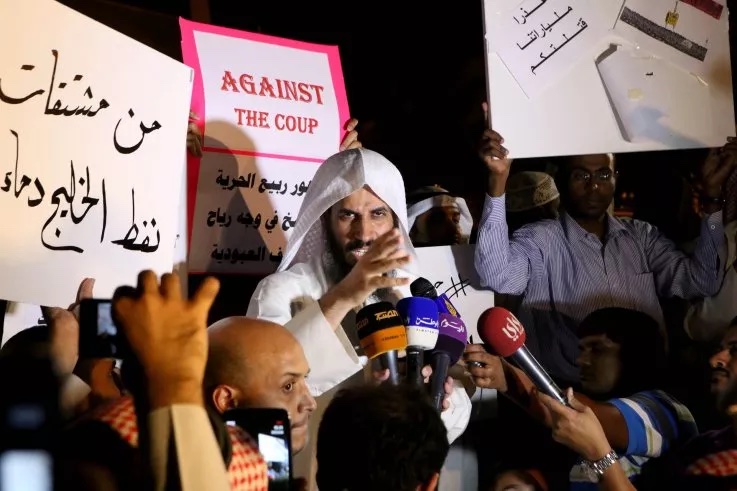
ISIS/AP
Militants parade through the streets of Raqqa, Syria in an undated image posted on Monday, June 30, 2014, by ISIS as propaganda. The United States has made strides toward stitching together a coalition to tackle the extremist group, but faces reluctance from Mideast allies who are deeply frustrated with a White House that they believe has been naive, fickle and weak on Syria’s civil war.
Another vocal Islamist member of the al-Ajmi tribe, Hajjaj al-Ajmi, a powerful Kuwaiti Sunni cleric who fund-raises for jihadist groups in Syria, has also caught Treasury’s attention. The Twitter bio that appears to be for his Qatari representative, Mubarak Alajji, describes Hajjaj al-Ajmi as liking “Sunni jihadists who hate Shia and infidels.” A Facebook page that appears to belong to Alajji is awash with photos of Syrian jihadist groups. He also heads up Twitter-sourced fund-raising campaigns that conflate jihadist fighting and humanitarian aid.
Kuwait, as of late last month, was the single largest donor of “uncommitted” aid to Syria—which means the funds between donor and recipient are not guaranteed to reach a specific cause or destination. Until October 22, around $200 million since the start of the Syrian civil war in 2011 had been donated to Syria without any official paper trail for the funds, according to the Financial Tracking Service (FTS), a global monitoring service managed by the U.N. Office for Coordination of Humanitarian Affairs. At the same time, FTS said that around $11 million had been given to anonymous Syrian “charities” by Qatari investors, without any documentation disclosing exactly who received the cash.
Few established worldwide humanitarian agencies have genuine links to the region, the Red Cross and Red Crescent tell Newsweek. As a result, any donations to smaller “humanitarian aid” groups provide no guarantee that they will actually reach genuine aid workers in the region.
Activists on the Turkish-Syrian border, who told Newsweek they would rather not be named for their own safety, confirmed that the flow of terrorists and rebel fighters between the two countries was virtually unpoliced.
Across the Turkish Border
A Homeland Security Department agent said that due to ISIS’s dependence on criminal networks, it is forced to trade mainly in cash. Operating in such a fashion is not difficult, as $1 million to $2 million can easily fit into a briefcase, and that is not an unusual practice in the Middle East among executives and businessmen. Combined with lax controls on the bags and briefcases that pass through many Middle East airports—particularly for the wealthy traveling in private planes—it’s not hard to see how large quantities of cash can quietly exchange hands across borders.
The ringleaders of the “humanitarian” and other fund-raising movements include Qatar-based Tariq bin al-Tahar al-Harzi, 32, named in September by the U.S. Treasury as an ISIS fundraiser who gathered around $2 million from Qatari funders that was sent straight to ISIS.

TREASURY DEPARTMENT
Abd al-Rahman bin ‘Umayr al Nu’ayaiU.S.
Treasury also singled out Qatari Salim al-Kuwaru, who secured “hundreds of thousands of dollars” for ISIS, as well as acting as the financier for the terror group’s Iraqi affiliates. A third Qatari targeted by Treasury is Abd al-Rahman bin ‘Umayr al-Nu’aymi, a funder and fixer for ISIS-linked Islamist groups in Syria and Iraq who, according to a December Treasury report, “oversaw the transfer of over $2 million per month to [Al-Qaeda] in Iraq for a period of time.”
Many of the fund-raising campaigns are not explicitly advertised as benefitting ISIS, observes Rafiq. But with Islamist fighting dominated by ISIS, he says the terrorists “can have their pick of any resources sent to Syria or Iraq, especially to smaller Islamist groups.… They are the biggest beast in the jungle now.”
ISIS is currently receiving enough steady supplies of funds to sustain itself for the foreseeable future, says Kurdish Intelligence’s Barzani, noting that “many people who believe in these extremist ideologies believe it is their duty to donate.”
More Mammon Than Islam
ISIS has made it clear its mission is less about Islam than about mammon. In June, when ISIS took Mosul, Iraq, and commandeered its 12 bank branches, its fighters went straight to the homes of bank employees—who weren’t working, in observation of the holy month of Ramadan—and forced them to reopen the Iraqi Central Bank, the former governor of Nineveh province Atheel al-Nujaifi told Newsweek.
Along with cash kept in bank vaults in the Iraqi city of Tikrit, an estimated total of $1.5 billion has been seized from banks by ISIS, witnesses in Iraq told Newsweek. “ISIS was inside the banks,” says an Iraq-based American refugee worker in Erbil, whose circle of associates in Mosul includes a Christian teacher who “went to the bank to take out money and was not allowed to.… No other employees were there, just ISIS militants.… People in Mosul believe ISIS has stolen the money.” Others making withdrawals from banks in ISIS-occupied cities are “taxed” up to 10 percent, according to Treasury, which says ISIS routinely robs banks.
In ISIS’s seat of power, Raqqa, Syria—on the northeast bank of the Euphrates—terrorists repurposed the art school into a customs building to monitor all goods coming into and out of the city, including food, medicine and electronics, Raqqa residents who escaped the area told Newsweek. ISIS applies a “tax” to all goods imported to or exported from the city. ISIS even “taxes” groups providing genuine humanitarian aid in its own war zone. “ISIS taxes people transporting nearly anything,” says one Lebanese intelligence officer. “Allowing local smuggling and other illicit activities, while against the tenets of Islam, allows for a very lucrative revenue stream.”

TREASURY DEPARTMENT
Abd al-Rahman bin ‘Umayr al Nu’ayaiU.S.
Treasury also singled out Qatari Salim al-Kuwaru, who secured “hundreds of thousands of dollars” for ISIS, as well as acting as the financier for the terror group’s Iraqi affiliates. A third Qatari targeted by Treasury is Abd al-Rahman bin ‘Umayr al-Nu’aymi, a funder and fixer for ISIS-linked Islamist groups in Syria and Iraq who, according to a December Treasury report, “oversaw the transfer of over $2 million per month to [Al-Qaeda] in Iraq for a period of time.”
Many of the fund-raising campaigns are not explicitly advertised as benefitting ISIS, observes Rafiq. But with Islamist fighting dominated by ISIS, he says the terrorists “can have their pick of any resources sent to Syria or Iraq, especially to smaller Islamist groups.… They are the biggest beast in the jungle now.”
ISIS is currently receiving enough steady supplies of funds to sustain itself for the foreseeable future, says Kurdish Intelligence’s Barzani, noting that “many people who believe in these extremist ideologies believe it is their duty to donate.”
More Mammon Than Islam
ISIS has made it clear its mission is less about Islam than about mammon. In June, when ISIS took Mosul, Iraq, and commandeered its 12 bank branches, its fighters went straight to the homes of bank employees—who weren’t working, in observation of the holy month of Ramadan—and forced them to reopen the Iraqi Central Bank, the former governor of Nineveh province Atheel al-Nujaifi told Newsweek.
Along with cash kept in bank vaults in the Iraqi city of Tikrit, an estimated total of $1.5 billion has been seized from banks by ISIS, witnesses in Iraq told Newsweek. “ISIS was inside the banks,” says an Iraq-based American refugee worker in Erbil, whose circle of associates in Mosul includes a Christian teacher who “went to the bank to take out money and was not allowed to.… No other employees were there, just ISIS militants.… People in Mosul believe ISIS has stolen the money.” Others making withdrawals from banks in ISIS-occupied cities are “taxed” up to 10 percent, according to Treasury, which says ISIS routinely robs banks.
In ISIS’s seat of power, Raqqa, Syria—on the northeast bank of the Euphrates—terrorists repurposed the art school into a customs building to monitor all goods coming into and out of the city, including food, medicine and electronics, Raqqa residents who escaped the area told Newsweek. ISIS applies a “tax” to all goods imported to or exported from the city. ISIS even “taxes” groups providing genuine humanitarian aid in its own war zone. “ISIS taxes people transporting nearly anything,” says one Lebanese intelligence officer. “Allowing local smuggling and other illicit activities, while against the tenets of Islam, allows for a very lucrative revenue stream.”
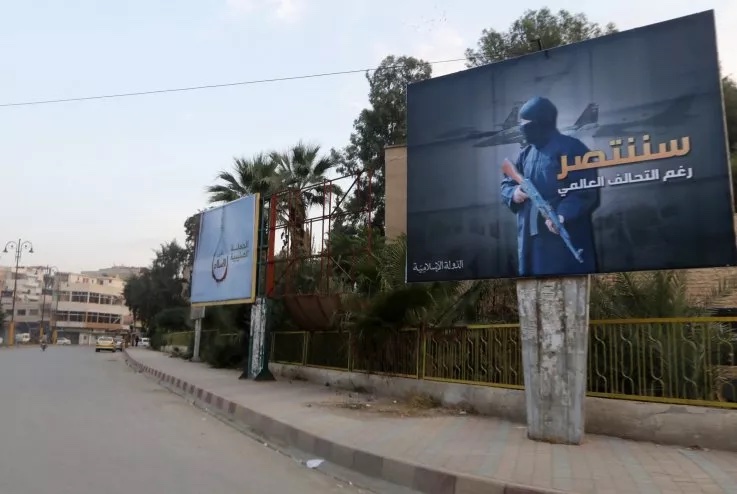
NOUR FOURAT/REUTERS
ISIS billboards are seen along a street in Raqqa, eastern Syria, which is controlled by the militant group, October 29, 2014. The billboard reads: “We will win despite the global coalition”.
Then there is straightforward theft from the people they have conquered. “When ISIS overran Mosul last June, they literally took necklaces off women—earrings off their ears. They also went after livestock, furniture, cars,” recalls Sajad Jiyad, an Iraqi analyst at Integrity, a London-based think tank.
Raising revenues to set up a viable state, rather than being motivated solely by religion, is what separates ISIS from Al-Qaeda and similar Islamist terrorist groups. And running a war against its neighbors and maintaining a state of 8 million residents is costly, says Cohen. “In order to keep track of all its revenues and costs, [ISIS] depends on complex management networks with [chief financial officer]-like figures at the top.”
ISIS’s diktats are strictly enforced, not just to keep the population in order but to replenish its funds. If shopkeepers and street vendors wish to stay in business, they must pay what is often the equivalent of hundreds of dollars a month, according to sources in Raqqa. And there are heavy fines, too, for stepping out of line. Raqqa residents are charged similar amounts if they do not attend Friday prayers at exactly the right time.
Looting Ancient Sites
More than a third of Iraq’s 12,000 important archaeological sites are now under ISIS control and it has hastily begun excavating and selling artifacts dating from 9,000 B.C. to A.D. 1,000 through intermediaries to collectors and dealers, says al-Hamdani. “It is the looting of the very roots of humanity, artifacts from the oldest civilizations in the world. A shrine, a tomb, a church, a palace or an archaeological site is dug up. They will sell the useful objects and destroy the rest.”
By some estimates, these sales now represent ISIS’s second largest source of funding. One of its biggest paydays recently came from looting the ninth century B.C. grand palace of the Assyrian king Ashurnasirpal II at Kalhu, which is now called Nimrud, says Aymen Jawad, executive director of Iraq Heritage, a London-based organization dedicated to preserving Iraq’s antiquities. “Tablets, manuscripts and cuneiforms are the most common artifacts being traded, and, unfortunately, this is being seen in Europe and America,” he says. “Hundreds of millions of dollars’ worth of irreplaceable pieces are being sold to fund terrorists.”
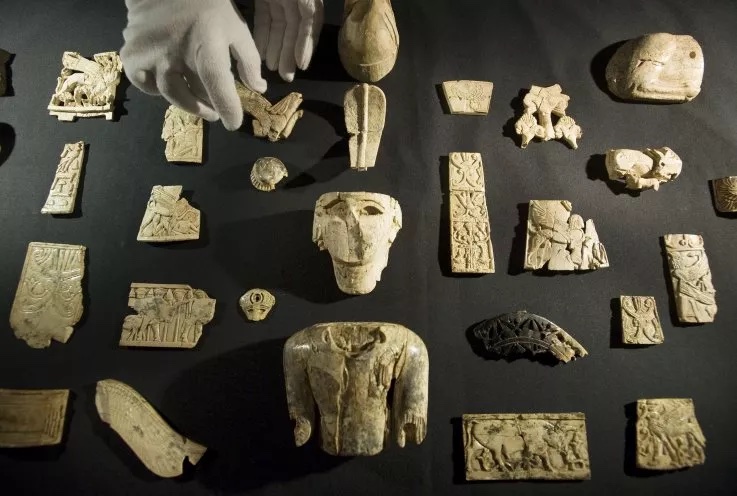
REX/AP
3,000 year old Nimrud Ivories on display at the Annual Review at the British Museum, London, in 2011. Relics such as these dated from the 9th to 7th century BC have been plundered from the city of Nimrud in modern day Iraq.
Those living near Nimrud tried to stop ISIS forces from entering the palace, but they were overpowered, says al-Hamdani, who also works for the Iraqi government’s Department of Antiquities. “ISIS went into the palace and took a bas-relief that weighed more than 3 to 4 tons,” he says. “They could not take the whole piece, so they cut it up and sold it.”
The largest of the black markets for Mesopotamian antiquities is in Turkey, which serves as the main conduit for ancient Middle East artifacts bound for Europe, says al-Hamdani. The second largest antiquities black market is selling to tourists in Jordan.
“They are smuggling the artifacts via Turkey, Iran and Syria,” Jawad told Newsweek.”Some of the tablets are as small as a matchbox, so smuggling them is such an easy task. However, some of our men on the ground have informed us some large items have been transported by truck.” To his dismay, some of the artifacts are reaching Western auction houses, he said, which “is ridiculous.”
A single Mesopotamian artifact can fetch hundreds of thousands of dollars, as evidenced by the sale in April of a cuneiform baked clay cylinder of Babylonian king Nebuchadnezzar II dating from 604 B.C. to 562 B.C., which sold for $605,000 to an anonymous buyer, according to Doyle New York auctioneers.
The specialist in charge of the sale, Edward Ripley-Duggan, told Newsweek auction houses have to be more vigilant to ensure historic pieces are “free from taint” in light of the artifacts being “looted in the recent conflicts in the Middle East.” If he had not been able to establish sales receipts and letters from sellers for the cylinder dating back to 1953, he says, he would not have sold it, nor would an honest collector buy it. “It seems to me any lower level of scrutiny is improper at a time when the wholesale destruction and pillaging of archaeological sites and museums in the region is rampant.” Even so, al-Hamdani says, ancient artifacts will always be a magnet for unscrupulous buyers.
“You cannot hide such unique artifacts forever,” he says. “These antiquities cannot be confused with those of any other period in history. They will be recognized on sight. But once a private collector gets it, he can falsify documents, say it was inherited from a family member. It is hard for us to imagine how paperwork like this can be faked, but these are rich people. They can do it.”
Ancient objects may be the most lucrative things to sell, but ISIS is not picky; it is also happy to sell stolen wheat, barley, rice, livestock—even people.
Kidnappings for Cash
When ISIS fighters swept through northern Iraq over the summer toward Erbil, they requisitioned silos and grain stockpiles and took control of farms and fields. As a result, ISIS now controls nine grain silos in Nineveh, which spans the Tigris, and seven more elsewhere. It owns hundreds of thousands of tons of wheat representing 40 percent of Iraq’s annual wheat production, according to U.N. estimates, which allows ISIS to reward those it favors with food while leaving hungry those it does not.
Then there is the ISIS market in human lives. Ransoms from kidnappings make up about 20 percent of ISIS’s revenue, says Integrity’s Jiyad. The U.S. Treasury estimates ISIS has received $20 million in ransoms so far this year. If a ransom is paid, the person is freed—if not, he or she is killed. Sometimes ISIS forces allow victims to telephone their families to report that they are being tortured, in the hope of raising a large ransom to secure their freedom.
One well-placed Iraqi source based in Qatar toldNewsweek the number of kidnappings of women who were then forced into marriage or sold for sex is around 4,000 Yazidi women and girls—not including children—and “more than that from the Shia-Turkoman minorities.” At a prison in Mosul, girls as young as 14 have been forced to make a choice: convert to Islam and be sold as wives or refuse and be forced into sexual slavery.
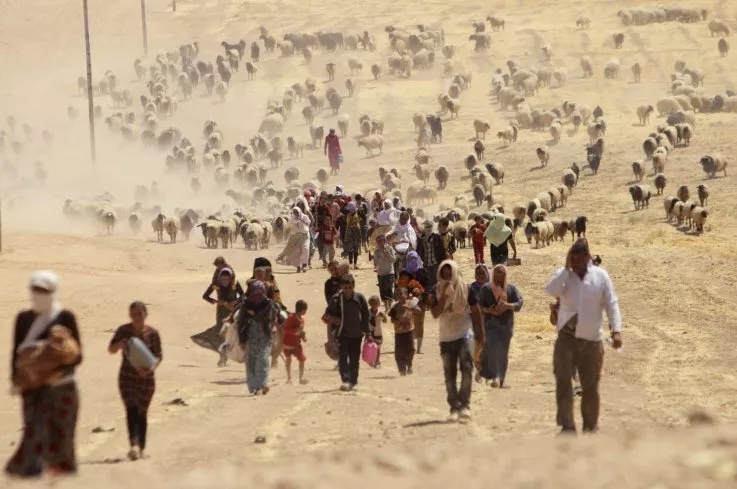
RODI SAID/REUTERS
When the families of American journalists Jim Foley and Steven Sotloff were notified that their sons were being held for ransom by ISIS, they were warned by U.S. officials not to pay up because it was illegal. No money changed hands, and the pair were beheaded by ISIS.
“Their deaths were about an economic transaction,” says a British security consultant, who spoke to Newsweek on condition of anonymity as he is still working to free ISIS hostages. “Steve [Sotloff] was not murdered because of religion, or Jim [Foley] or Alan [Henning, a British aid worker] because of politics. It was because ISIS money demands were not met.” (Britons are also forbidden by law to pay ransoms.) There is considerable doubt whether American and British hostages would be released even if money was raised, the purpose of the high prices put on their heads likely reflecting a desire by ISIS to embarrass governments that insist on not paying ransoms.
By contrast, two Spanish journalists held by ISIS were freed in March, and four captive French journalists were released in April. While governments whose citizens have been released will not admit to paying for their citizens’ lives, it is known in hostage-negotiation circles that some European governments do pay.
France is thought to have paid $14 million for the four journalists’ release; Spain is also believed to have paid ISIS ransoms for its journalists. “We do not, absolutely do not, pay for hostages,” a French Ministry of Foreign Affairs spokesman, Alexandre Giorgini, told Newsweek. French President François Hollande has also said this. Yet it is well known among intelligence and defense sources in France and Europe that ransoms for French captives are paid, if not through official government sources then through secret funds, private contributions or family efforts.
There is no consensus on how to deal with ISIS’s demands for ransoms—which is probably why Cohen says that “kidnapping for ransom is one of the most significant terrorist financing threats today.” Nor is there a way of knowing how widespread the practice is. “Any organization’s kidnappings or ransoms [are always kept] very hush-hush,” says the American refugee worker in Iraq. And those closest to freed hostages say they are encouraged by government officials to say nothing of the deals that brought about the release of their relatives.
‘Gagged by the Government’
The U.S. and U.K. governments have adhered to a two-fold strategy when dealing with ISIS ransom demands: a media blackout and an ironclad refusal to pay. “We maintain this policy not because we are coldhearted,” Cohen said, but because refusing to pay ransoms “makes it less likely that Americans will be taken hostage.” The U.S. has also indicated that paying for hostages to be freed can be interpreted as a breach in legally binding sanctions.
When the Foleys met in Bayeux, France, last month with the French journalists who had been held with their son in Syria before they were freed, they criticized the U.S.’s and U.K.’s decision as “condemning their citizens to death.” The Foleys claimed they had been threatened with prosecution “three times” by U.S. authorities if they tried to raise ransom money. (The State Department denies this.) Henning’s brother said his family was “gagged by the government” to keep mum about the kidnapping until shortly before Henning’s death.
Kidnapping for ransom isn’t just for foreigners. If ISIS thinks it can get a good payout, it will kidnap people in its own communities, says Jiyad. According to al-Nujaifi, the terrorist group will demand anything from $500 to $200,000 for locals. It is not unheard-of, he said, for the family of a captive to sell its farm and livestock to recover a loved one.
The lootings, ransoms and extortion that go toward funding ISIS’s day-to-day operations provide a steady cash flow, al-Nujaifi says. But “this is nothing compared to what oil trafficking provides.” Indeed, it is the energy assets seized by ISIS that are believed to be the jewel in its crown—and the engine of its mighty war machine.
Which means this is also ISIS’s greatest point of vulnerability.
ISIS’s oil empire stretches across a landmass roughly the size of the U.K. (a quarter of a million square miles) and contains around 300 oil wells in Iraq alone, according to the latest data from the Iraq Energy Institute in Baghdad. Some of the biggest seizures include wells and production facilities in Hamrin, with at least 41 wells, and Ajil, with 76.
Energy assets in the cities of Sfaya, Qaiyara, Najma, Jawan, Qasab, Taza and West Tikrit are all now under ISIS’s control, says al-Khatteeb, who is also director of the Iraq Energy Institute.
At its peak over the summer, ISIS operated around 350 oil wells in Iraq, Al-Khatteeb says. After battling with the Kurdish peshmerga and coming under fire from U.S.-led airstrikes, which began August 8, it lost around 45 of them—including in Ain Zala and Butma—and it torched a few fields as it pulled out. In both locations, the peshmerga recaptured wells with a total output of around 15,000 barrels a day.
Roll Out the Barrels
The remaining wells in Iraq under ISIS control have a combined production capacity of 80,000 barrels a day—a fraction of Iraq’s total production of around 3 million barrels a day. By contrast, ISIS possesses about 60 percent of Syria’s total production capacity, which, before the civil war kicked into high gear, produced around 385,000 barrels a day, according to the Iraq Energy Institute.
ISIS does not appear to have access to working oil pipelines, and it lacks the expertise to maintain its oil fields for any length of time. In Syria, oil fields under its control are more mature, requiring greater extraction skills, compared with the higher-yielding fields in Iraq.
Ransom, looting, extortion, sex trafficking and taking over the Iraqi Central Bank may help fund ISIS’s day-to-day operations, but it is the organization’s energy assets that are believed necessary to refill its war chest—not just by selling oil abroad but to run its tanks and armored personnel carriers.
Which makes ISIS’s oil empire its Achilles’ heel. “ISIS has at least 40,000 fighters and fully armed convoys—we’re talking about hundreds of vehicles—plus, they need to produce enough fuel to satisfy their local populations,” says al-Khatteeb. “That calls for at least 70,000 to 80,000 barrels a day of refined product.” A more comfortable wartime supply, he says, would be even more—around 170,000 to 200,000 barrels a day.
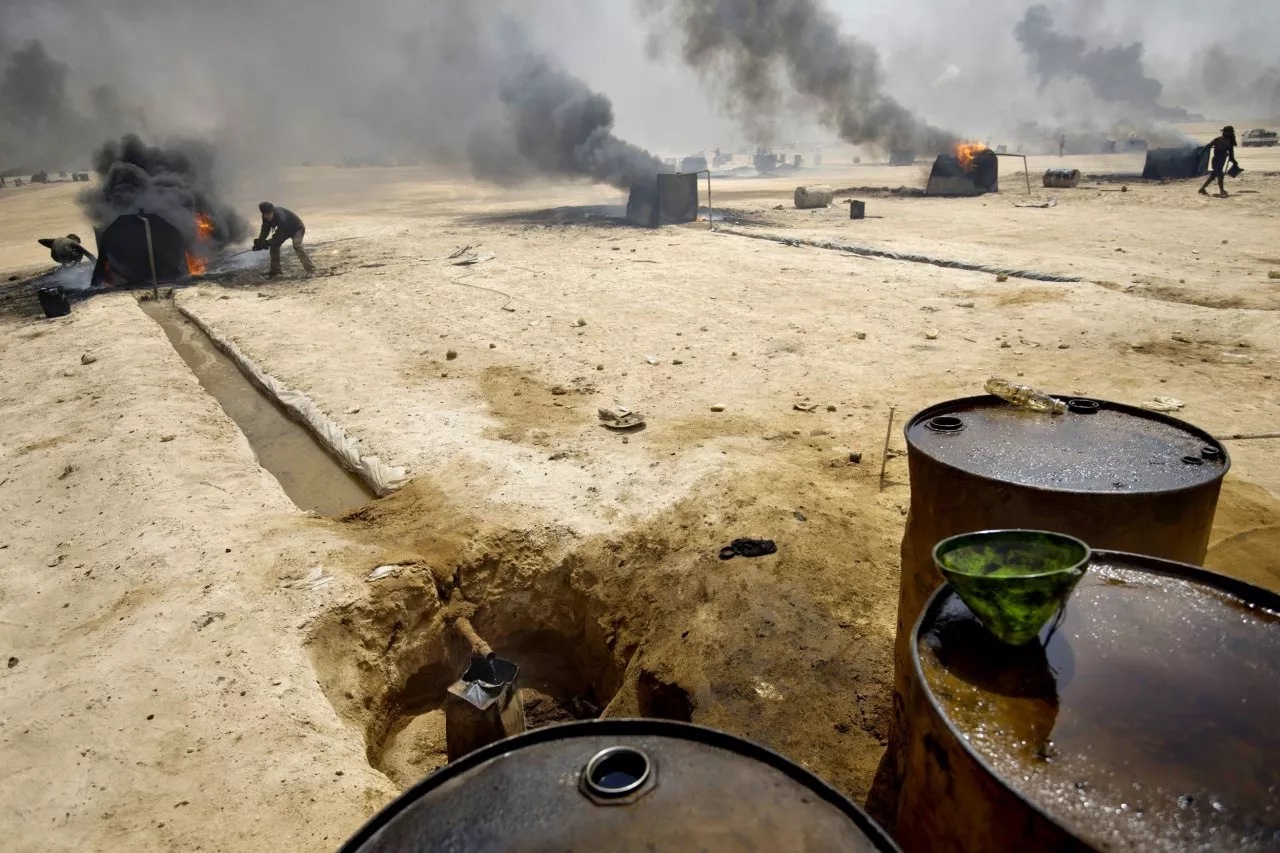
DAVID ROSE/PANOS-REA/REDUX
Iraq is bordered by six countries: Syria, Saudi Arabia, Iran, Jordan, Kuwait and Turkey. ISIS moves oil and fuel across some of these borders with tanker trucks for sale beyond its borders. Turkey’s southern corridor, Iraq’s northwestern corridor and Syria’s northeastern corridor all contain crossing points. Iraqi Kurdistan is another favorite conduit for oil and fuel, to be sold to Turkey. The regional Kurdish government in Iraq recently arrested some of its own citizens along with a number of Kurdish politicians and security officials for acting as intermediaries in smuggling out oil and fuel on behalf of ISIS.
“ISIS seems to have zero problems moving fuel across borders,” says al-Khatteeb, observing that airstrikes do not appear to be curbing ISIS’s oil trade. ISIS advances through Iraq this summer led to an initial supply infusion of up to 3 million barrels from the draining of four oil pipelines, with more coming from storage facilities in the parts of Iraq it occupied. Sustained attacks on ISIS’s oil and fuel holdings by the U.S.-led coalition should, however, have uncovered the weaknesses in its fuel supply chain by now, he says. But that has not happened. “If they really had a problem with fuel, by now we would have seen the Iraqi army advancing and pushing them to the border of Turkey,” says al-Khatteeb.
ISIS Agents in Erbil
A complicating factor in trying to seal Iraq’s porous borders has been allowing refugees in while keeping terrorists out. As ISIS rolled across northern Iraq in June, driving hundreds of thousands from their homes, an influx of vehicles from ISIS-occupied Iraq appeared on the streets of Iraqi Kurdistan—with whited-out license plates, says the American refugee worker based in Erbil. She still sees them. “I know that they try to police vehicles that look suspicious, but anything that can let refugees through can potentially let ISIS through,” she says.
By late October, Iraqi Kurdistan was playing host to 860,000 displaced Iraqis and 220,000 Syrian refugees. Its displaced persons population topped 1 million over the summer, with refugees crowding backyards, churches and schools. Citing secret security reports, the refugee worker told Newsweek that ISIS members had infiltrated Erbil, Iraqi Kurdistan’s capital. “The government isn’t acknowledging it,” she says. “But we know ISIS is here.”
Smuggling fuel is easier in a city like Erbil than smuggling oil. “If you’re smuggling crude oil, you have to smuggle a large quantity of it to get value. It’s not like diamonds,” says Peter Galbraith, a former U.S. ambassador to Croatia who advises the Kurdistan Regional Government in northern Iraq. “That’s why it’s better to have a pipeline. Now, if you’re taking a refined product like diesel or some other fuel, then it is possible to transport and sell it in small amounts.”
ISIS is able to produce only around a fifth of its oil fields’ total capacity in Iraq and Syria, so ISIS is probably getting help from its oil-rich neighbors, says al-Khatteeb. Cohen has confirmed this, saying that, despite their hostility to ISIS, the Kurds in Iraq, Turkey and Syria have all done deals with ISIS, often through middlemen.
Iraq is bordered by six countries: Syria, Saudi Arabia, Iran, Jordan, Kuwait and Turkey. ISIS moves oil and fuel across some of these borders with tanker trucks for sale beyond its borders. Turkey’s southern corridor, Iraq’s northwestern corridor and Syria’s northeastern corridor all contain crossing points. Iraqi Kurdistan is another favorite conduit for oil and fuel, to be sold to Turkey. The regional Kurdish government in Iraq recently arrested some of its own citizens along with a number of Kurdish politicians and security officials for acting as intermediaries in smuggling out oil and fuel on behalf of ISIS.
“ISIS seems to have zero problems moving fuel across borders,” says al-Khatteeb, observing that airstrikes do not appear to be curbing ISIS’s oil trade. ISIS advances through Iraq this summer led to an initial supply infusion of up to 3 million barrels from the draining of four oil pipelines, with more coming from storage facilities in the parts of Iraq it occupied. Sustained attacks on ISIS’s oil and fuel holdings by the U.S.-led coalition should, however, have uncovered the weaknesses in its fuel supply chain by now, he says. But that has not happened. “If they really had a problem with fuel, by now we would have seen the Iraqi army advancing and pushing them to the border of Turkey,” says al-Khatteeb.
ISIS Agents in Erbil
A complicating factor in trying to seal Iraq’s porous borders has been allowing refugees in while keeping terrorists out. As ISIS rolled across northern Iraq in June, driving hundreds of thousands from their homes, an influx of vehicles from ISIS-occupied Iraq appeared on the streets of Iraqi Kurdistan—with whited-out license plates, says the American refugee worker based in Erbil. She still sees them. “I know that they try to police vehicles that look suspicious, but anything that can let refugees through can potentially let ISIS through,” she says.
By late October, Iraqi Kurdistan was playing host to 860,000 displaced Iraqis and 220,000 Syrian refugees. Its displaced persons population topped 1 million over the summer, with refugees crowding backyards, churches and schools. Citing secret security reports, the refugee worker told Newsweek that ISIS members had infiltrated Erbil, Iraqi Kurdistan’s capital. “The government isn’t acknowledging it,” she says. “But we know ISIS is here.”
Smuggling fuel is easier in a city like Erbil than smuggling oil. “If you’re smuggling crude oil, you have to smuggle a large quantity of it to get value. It’s not like diamonds,” says Peter Galbraith, a former U.S. ambassador to Croatia who advises the Kurdistan Regional Government in northern Iraq. “That’s why it’s better to have a pipeline. Now, if you’re taking a refined product like diesel or some other fuel, then it is possible to transport and sell it in small amounts.”
Just as ISIS middlemen use mobile-messaging platforms like Whatsapp and Kik to coordinate their funding, so apps are used to arrange oil and fuel deliveries. While around 30,000 troops now stand on the Saudi side of the kingdom’s border with Iraq, Turkey, for its part, has struggled to lock down its border with ISIS-held Iraq, which stretches across 770 miles. “They can’t watch all of it,” says al-Khatteeb, who has heard that ISIS is importing refined fuel from Turkey in exchange for crude oil.

REUTERS
An armed motorcade belonging to members of Derna’s Islamic Youth Council, consisting of former members of militias from the town of Derna, drive along a road in Derna, eastern Libya October 3, 2014. The group pledged allegiance to the Islamic State on October 3, 2014 local media reported. Picture taken October 3, 2014.
“Our best understanding is that [ISIS] has tapped into a long-standing and deeply rooted black market connecting traders in and around the area,” Cohen has said. The U.S. is working “with our partners in the region to choke off cross-border smuggling routes and to identify those involved in smuggling networks.”
All told, ISIS’s oil operations in Iraq and Syria are producing around 50,000 to 60,000 barrels a day as of mid-October, according to IHS, an energy research consultancy based in Englewood, Colorado. That’s a drop in the bucket compared with total global oil production of more than 90 million barrels a day.
Oil sales are providing ISIS with around $2.5 million a day, IHS estimates, but at a discount price. ISIS sells oil at $40 a barrel on average when the world price is currently over $80 a barrel. But airstrikes and the ebb and flow of war have made ISIS oil production and the price of a barrel it can charge fluctuate wildly. “Selling prices range from $25 to $60 a barrel,” IHS reported recently. In other words, depending on whether it’s a good or bad day, ISIS’s oil revenues can vary between $1.5 million and $3.6 million a day.
Apocalypse Now
Even though its oil is of a poorer quality than much of what is on sale in the rest of the world, ISIS can still expect revenues of around $800 million a year, on an annualized basis, according to IHS. Galbraith reckons ISIS may be doing even better than that, particularly in areas of Iraq it occupies where there may be a shortage. “Most of [ISIS oil] appears to be refined locally and going through domestic sales, where they can charge a premium to areas cut off from outside supplies,” he tells Newsweek. The price? Up to $200 a barrel.
“It’s a medieval environment, an apocalyptic environment, where the only people who get the food and the fuel are likely the ones with the money and the guns,” says Michael Knights, an Iraq analyst at the Washington Institute for Near East Policy.
But while ISIS may currently be doing well, over the medium to long term it faces serious challenges with oil-field maintenance, oil recovery and refining crude oil into fuel. The mega-refinery ISIS would dearly like to seize—the Baiji refinery, 130 miles north of Baghdad—is being successfully defended by the Iraqis and U.S. special forces. As a result, it must rely on its own refineries and roughly hewn “mobile refineries,” which produce poor-quality fuel and process only 300 to 1,000 barrels a day each.
Given how easily they are assembled and disassembled, it is impossible to estimate the number of mobile refineries in areas held by ISIS. U.S. Central Command says it is sending bomber, fighter, attack and remotely piloted aircraft to take out oil-collection equipment, oil tanks, tanker trucks and, in one case, an oil pumping station. But since the campaign began, it has struck only around a dozen mobile refineries. “You destroy a mobile refinery that produces 500 barrels a day? It’s a joke,” an Iraqi energy expert told Newsweek.
Asked what the impact of airstrikes has been on ISIS’s energy assets so far, U.S. Central Command referred Newsweek to Treasury, which emailed the following statement: “There’s no doubt that airstrikes have had an impact on [ISIS’s] ability to generate and earn revenue, though at this time we do not have formal estimates to share.”
A Lebanese intelligence officer familiar with ISIS’s energy operations told Newsweek that the terrorist group’s oil and fuel sales “have been downgraded by only about 35 percent by the airstrikes, with the loss of being unable to produce oil funds at peak activity.” But, he added, “their refineries are usually mobile and easily reestablished.”
Cohen says it will take some time to block ISIS’s multiple revenue streams, which he describes as “diverse and deep.” However, last month he said he expects to see some impact on the organization’s financial standing in less than 36 months.
Knights says ISIS may suffer from a sharp drop in its revenue well before the U.S. is able to defeat it. “They have a pretty diverse portfolio, but ISIS-controlled areas are slowly cycling downward economically, because you can’t steal from people indefinitely,” he says. “I am not going to say they’ve killed the golden goose, but let’s just say they don’t have a sustainable economic model.” Recent reports indicate that Mosul, the largest city under ISIS control, is experiencing shortages of water, food and kerosene, with the local economy in a state of near collapse.
The Fear Factor
Al-Khatteeb believes keeping such a large population under its sway will eventually take a heavy toll on ISIS’s ability to govern and fight. “I cannot imagine that these 8 million people under ISIS control are happy with their lives or wanting to see them succeed. It seems more likely they are operating out of fear,” he says.
A Brookings analysis of ISIS notes that “in asymmetric conflict, if insurgents survive 12 months of activity, the likelihood of opposition victory increases significantly, but should the conflict perpetuate for at least three years, the chance of insurgent victory begins to diminish and political agreements become more likely.”
Galbraith is pessimistic. His biggest concern is the lack of a ground army powerful enough to defeat ISIS—apart from that of the U.S., whose engagement at ground level has been strictly ruled out by President Barack Obama. “When I look at ISIS, I don’t see them becoming one of the great societies of the Middle East. On the other hand, I don’t see them being defeated either,” he said. “We may be able to contain them, but it is hard to see who is going to overtake them.”
Additional reporting by Binar Faeq.
Related Stories
How Credit Card Companies Prey on Millennials
How Credit Card Companies Prey on Millennials Leah McGrath GoodmanNewsweekAugust 18, 2016hen Kelly Dilworth applied for a Discover card in July, she was happy to learn that her spending limit was $13,000—a level most card companies don't offer...
As Man-Made Earthquakes Thunder Through Oklahoma, Residents Get Innovative With the Law
In Oklahoma, a stone or brick home might save you from a tornado. But it might kill you if there’s an earthquake—and the Dills, who live in the one-story stone-and-mortar farmhouse with their five dogs, have been overwhelmed with quakes.
Wall Street May Be Panicking About the Swings in Oil Prices—But You Shouldn’t
Wall Street May Be Panicking About the Swings in Oil Prices—But You Shouldn'tLeah McGrath GoodmanNewsweekFebruary 3, 2016he headlines tell us that oil's fall below $30 a barrel in January and loss of nearly 50 percent of its value in 2015 could...



